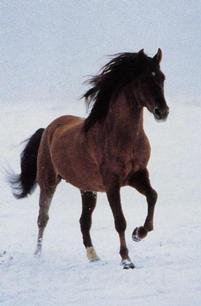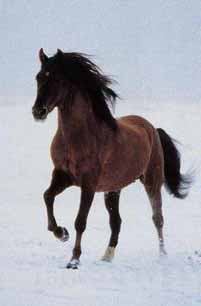

Scientists have created the world's first clone of a horse, raising the prospect of genetic copies being made of champion thoroughbreds.A team of Italian veterinary researchers said yesterday that the foal, called Prometea, was born naturally on 28 May to a surrogate mare who also provided the genetic material for the cloning process.
So Prometea has made scientific history twice - for being the first horse clone and for being the only cloned animal to be born by a surrogate mother which was also a genetic twin.
The researchers said the experiment showed that, in theory, it would be possible to "breed" from geldings - castrated stallions - that would otherwise be excluded from contributing to a bloodstock line.
Giovanna Lazzari, a veterinary scientist from the Lazzaro Spallanzani institute in Cremona, said that the birth of Prometea demonstrated there was no technical barrier that prevented a cloned animal from being pregnant with her own clone. Dr Lazzari said: "The cloning of the horse was attempted just on scientific grounds but, in terms of the practical implications, you can imagine that someone may want to clone a famous horse."
The scientists, led by Professor Cesare Galli, obtained skin cells from two horses, an Arabian thoroughbred stallion and a Haflinger mare, and fused their cell nuclei with 513 eggs obtained from an abattoir, creating 328 embryos.
The scientists achieved four pregnancies from the transfer of embryos into surrogate mothers. Only one of these resulted in the birth of a healthy foal - Prometea - who just happened to be carried by the surrogate Haflinger mother whose skin cells were used in the cloning process.
Dr Lazzari said: "It means that she gave birth to a genetically identical foal. We didn't plan it. We got embryos from the mare and implanted them into many other mares."
The research, published in the scientific journal Nature, comes after the birth of a cloned mule on 4 May.
Professor Galli and his colleagues said that cloning a horse could offer new ways of reproducing the inherited traits of valuable livestock, either racing horses or showjumpers. They write: "In principle, cloning could enable gelding champions to contribute their genotype to future generations, as well as opening up the opportunity to verify the reproducibility of traits such as character and sporting performance."
Philip Freedman, the chairman of the Thoroughbred Breeders' Association, said the development was of "no value" to the racing community because horses created by artificial insemination could not enter racing stud books.
He said it was "theoretically possible" that the fertility technology could be used privately, or for showjumping animals. He said: "With these developments, there is the worry, as with sheep, that they will be more susceptible to disease."
John Maxse of the Jockey Club said that he too saw no prospect of racing changing its current position to allow cloned horses to run.
He said: "Racing is a sport, not an industry, and a fundamental part of any sport is the element of the unknown regarding a result, the combination of skill and luck which contributes to the unpredictability of the outcome of an event.
"Like trainers, owners and jockeys, breeders are participants in the sport of racing - their success as breeders relies on the combination of skill and luck, allowing the cloning of horses relies on neither skill of the breeder nor luck."
But Professor Twink Allen, of the Equine Fertility Unit in Newmarket, said that the birth was a "wonderful breakthrough" because it is not possible to breed from geldings. Professor Allen said: "There [will have] to be much more research to make [the technique] more practical to use."
HOME
Dr Clone
Rat Clone
Cloning Fido
Cloning Cats
First Human Clone?